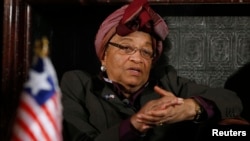Liberian President Ellen Johnson Sirleaf said she supports the call by Liberians to reduce the presidential term of office from two six-year terms to two four-year terms.
A constitution review commission set up by Sirleaf recommended last year to reduce the number of years the president can serve. The commission also recommended the term of office for senators be reduced from the current nine years to six, and representatives from six to four years. Information Minister Lewis Brown said Sirleaf’s support to change the presidential term to two four-year terms is part of her effort to build a democratic governance model that is transparent and that every Liberian can feel a part of.
“She has, in fact, written the legislature and she has asked to actually consider amending the presidential term to two four-year terms rather than what it is today which is two six-year terms. In effect, limiting the president to a maximum of eight years in office," he said.
Under the current 1986 constitution, the president and vice president serve six-year terms, senators serve for nine years and members of the House of Representatives six years.
Members of the Senate and House of Representatives can run for re-election for as many times as they wish as long they are elected by their constituents.
Brown would not say if Sirleaf is trying to set an example for other African leaders who are trying to change their countries’ constitutions to extend their stay in power.
“Well, if her example is anything to go by, then certainly it speaks to the fact that she will favor presidential term limit. Now, whether she is sending a message to the rest of Africa, I’m not in the position to say. But I know that her entire leadership has been around making sure that Liberia is best positioned, whether it be through economic transformation, whether it be political transformation, so that every citizen feels a duty to their country in the first instance and that we can deepen the institutional capacity of our society to build the kind of democratic governance model that is a bit more transparent, and a bit more accountable to the people,” Brown said.
Many long-serving African leaders have been using what has been dubbed by some as a “softer, gentler coup d’état” to stay in power by reforming their countries’ constitutions.
The tactic has been used by Zimbabwean President Robert Mugabe, Equatorial Guinea’s Teodoro Obiang, Jose Eduardo dos Santos of Angola, and Ugandan President Yoweri Museveni, who is in a tight re-election fight in polling scheduled for next month.
Most recently, Burundian President Pierre Nkurunziza won a controversial third term in an election that his critics said violated the constitution. In Rwanda, the parliament removed the two seven-year presidential term limit and paved the way for President Paul Kagame to continue in office.
Liberia's Constitutional Review Conference approved several recommendations, including a provision making Liberia a ‘Christian’ nation, the election of superintendents of the country’s 15 political subdivisions by the citizens rather than by presidential appointment, equal representation for women, and rejection of dual citizenship.
Brown said Sirleaf supports dual citizenship because she feels the country would benefit economically.
“It is not in the best interest of our country to alienate people who were born to Liberian parentage, people who are truly Liberians. And she used other economic indicators that dual citizenship has had a positive impact on the economy, especially at a time when we need to invest in our country,” Brown said.
The Liberian legislature, which returns to work next week from its summer break, will have to approve the term limits recommendations before they are put to a national referendum.
Liberia holds presidential election in 2017.






